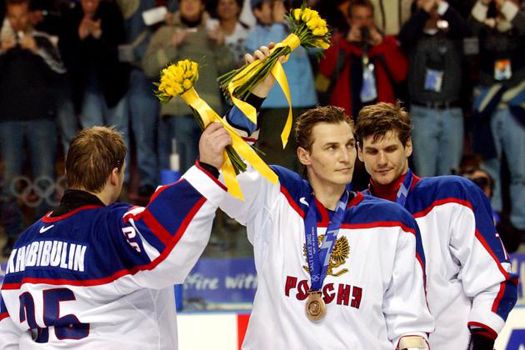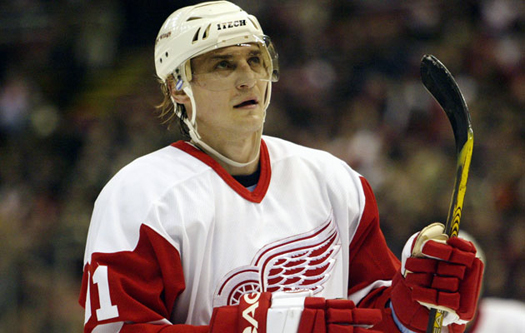“Candidates for election as Honoured Members in the player category shall be chosen on the basis of their playing ability, sportsmanship, character and their contribution to their team or teams and to the game of hockey in general”
Over the next few years, the Hockey Hall of Fame will see just how internationally strong the game has become. Since the end of the 2005 lockout, we’ve seen much of a generation of superstars retire from the game, which means the Hall of Fame is just catching up to it now. On an international level we’ve started to see it with
Mats Sundin and
Peter Forsberg joining
Borje Salming as the only Swedish players in the Hall of Fame,
Dominik Hasek joining
Peter Stastny as the only Czech players in the Hall (I’m aware Stastny was Czechoslovakian when he played and could be considered both), as well as
Pavel Bure joining the likes of
Viacheslav Fetisov, and
Igor Larionov who played for both the Soviet Union/Russia and in the NHL. This will be a continuing trend as we’ve seen the likes of
Daniel Alfredsson, and
Teemu Selanne retiring as well as
Jaromir Jagr who is still playing.
This year’s newly eligible players are no different. Two weeks ago I made the case for
Nicklas Lidstrom to be the fourth Swedish player to be inducted to the Hall of Fame. This week is one of the most prolific scorers, not just from his home country, but of the generation that he played in.
Sergei Viktorovich Fedorov was drafted in the 4th round of the 1989 NHL Entry Draft, 74th overall. However, the beginning of his career does not start here, it starts in his home, the Soviet Union. In the 1980s, the players that made the Soviet Union such a success were starting to get older and not be as productive as they used to be. So like in any sports system, the Soviets decided to inject some young blood into their system. They created their version of the “Kid Line” in 1989, which included Fedorov between
Alexander Mogilny and Pavel Bure. After the Soviets won Gold World Juniors tournament in 1989, Mogliny disappeared from his hotel room and would resurface in the United States not too long later become the first Soviet to defect.
Fedorov wouldn’t be too far behind him, but he wanted to do it the legal way. Unfortunately, the Soviet head coach
Viktor Tikhonov did give him that choice. When Fedorov’s military serviced would end in 1990, Tikhonov gave him an ultimatum saying to file an application to become a commanding officer in the army or he would never play for the national team again. Knowing this, Fedorov felt he had no choice to defect. Thus when the Soviet Team made an appearance at the Goodwill Games 1990 in Seattle, he defected into the United States.
 Fedorov as a member of the Russian National Team
Fedorov as a member of the Russian National Team
Once in Detroit, the NHL world found out what the International Hockey world already knew, Fedorov was a star. In his first year in the league, Fedorov would be the all-rookie first team scoring 31 goals and 79 points. He would have a steady progression until his apex in the 1994 season where he would score 56 goals and 120 points, winning the Hart Trophy as most valuable player, and the Selke Trophy as the best defensive forward. The next year, he would help lead the Detroit Red Wings to their first Stanley Cup Finals since 1966 where they would lose to the New Jersey Devils in a sweep. Two years later the Red Wings would not be denied. The Red Wings put together a 5 man unit which they dubbed “The Russian Five”. This unit included Fedorov, Larionov,
Vyacheslav Kozlov, Fetisov, and
Vladimir Konstantinov. By the end of the playoffs, the Red Wings would have dispatched the Philadelphia Flyers in a four game sweep to win the Stanley Cup for the first time since 1955. Fedorov would lead the team in scoring with 20 point in 20 games, but goaltender
Mike Vernon would win the Conn Smythe Trophy.
The next season, in my opinion, was a precursor to the 2005 Lockout and Fedorov was front and centre. As a restricted free agent, Fedorov was holding out from the Red Wings because they couldn’t come to an agreement. This led to the Carolina Hurricanes and GM Jim Rutherford to swoop in and sign Fedorov to an offer sheet. The terms of the offer sheet were that Fedorov would get a $14 million signing bonus, $2 million for 21 games of the season and another $12 million if the team reached the conference finals. As a relatively young team in a new market, Carolina knew that the likelihood of them reaching the conference final was slim to none. However, it forced Detroit to match that offer where it was quite likely for those terms to be met (and it was). The $38 million total became the highest salary ever paid to a player for a single season. On the day the NHL announced they were cancelling the season in 2005, Rutherford was asked on the “Chuck Swirsky Show” of the FAN590 in Toronto why he offered that contract to Fedorov. The answer was “Because we wanted to show our fans we meant business.” That to me was the problem with the old system as teams would shoot themselves in the foot.
Upon returning to the Red Wings, he joined a team that was on a mission to repeat as Stanley Cup Champions. The Wings were not able to celebrate their win from the year prior properly due to a car crash that ended Vladimir Konstantinov’s career. In the playoffs Fedorov would lead the team in goals with 10 and had 20 points overall as the Red Wings would sweep the Washington Capitals in four games to complete their task. However, this time it would be captain
Steve Yzerman who would claim the Conn Smythe Trophy.
The Red Wings would be perennial contenders after that. The team itself gained a reputation of being a world class organization that wanted to win. This led to numerous Hall of Fame players joining the Wings for the 2002 season such as
Brett Hull,
Luc Robitalle, and Dominik Hasek. On a team that already had the likes of Steve Yzerman, Nicklas Lidstrom, Sergei Fedorov,
Brendan Shanahan, and
Chris Chelios it made people believe that this is the greatest team to ever be constructed. They did not disappoint this season as the Wings would take out Fedorov’s “would be team”, the Carolina Hurricanes, in 5 games to win their 3rd Stanley Cup in 6 years.
After one more year in Detroit, Fedorov would leave as an unrestricted free agent to the Anaheim Mighty Ducks, signing a 5 year $40 million contract. In his time with the Ducks he would record his 1000th point, becoming the first Russian born player to do so. However, after the lockout, the Mighty Ducks were looking to retool. They originally agreed to a trade that would send Fedorov and a 5th round draft pick in 2006 (
Maxim Frechette to the Columbus Blue Jackets for
Todd Marchant,
Tyler Wright, and
Francois Beauchemin. The problem here was Marchant decided to invoke his no trade clause, blocking the trade. So officially the trade was Wright and Beauchemin for Fedorov and the draft pick. However, a side deal was made where Columbus put Marchant on waivers where Anaheim picked him up, thus completing the trade.
In Columbus he would play his 1000th game, becoming the 13th European to reach that feat. The Blue Jackets however, were not meshing properly thus they ended up trading Fedorov to the Washington Capitals for prospect
Theo Ruth. In his time in Washington he would team up with up and coming Russian, Alexander Ovechkin where they would lose in the 2nd round to the eventual Stanley Cup Champions, the Pittsburgh Penguins. It was in Washington where Fedorov would surpass he old Soviet teammate, Alexander Mogilny, to have the most goals out of any Russian born player (483). After losing to the Penguins, Fedorov returned to Russia to play three years in the KHL before retiring from the game of hockey in 2012.
To go along with his 3 Stanley Cups, 2 Selke Trophies, and 1 Hart Trophy, he also has a Gold Medal in the 1989, 1990, and 2008 World Championships as well a Silver Medal in the 2010 World Championships. He also have a Silver Medal in the 1998 Olympic Games in Nagano and a Bronze Medal in the 2002 Olympic Games in Salt Lake City. Lastly he has a Bronze Medal from the World Cup of Hockey in 1996 adding to his international reputation.
 Fedorov will be known for his time with the Red Wings
Fedorov will be known for his time with the Red Wings
The interesting thing about Fedorov’s eligibility is that he came out of retirement to play two games for CSKA Moscow in the 2013 Spengler Cup. Under the new rules that allow
Chris Pronger to be eligible for this year’s induction, technically make Fedorov ineligible. However, a caveat was added to the eligibility rule to allow common sense take over.
…a person is not eligible for election in the player category if he or she has played in a professional or international hockey game (which terms shall not be considered to include games played only or primarily for charitable or recreational purposes, or for any other limited purpose that the Chair of the Board of Directors determines, in his or her discretion, should not disqualify for nomination a person otherwise eligible) during any of the three (3) playing seasons immediately prior to his or her election.
This means that the Chair of the Board of the Hockey Hall of Fame, in this year’s case is still Jim Gregory, has the ability to say that those two games in the Spengler Cup will not impact Fedorov’s eligibility. In the conversation I had with Kelly Masse of the Hockey Hall of Fame, it appears this is the case for Fedorov.
Steve Yzerman said it best when it comes to Fedorov, “I’ve only seen two other players that can dominate a game like Sergei, and that’s Wayne and Mario… in my opinion, he’s the best player in the league. He is different than Wayne and Mario because he dominates with his speed and unbelieveable one-on-one moves.” To continue with that sentiment, his former coach,
Scotty Bowman said “I talked to
Wayne Gretzky… and he said to me: I couldn’t play forward and defence. Mario couldn’t do it. Jagr couldn’t play defense. But Sergei Could. He was a hell of a player.”
You can email me at
[email protected] or follow me on Twitter @Kirshenblatt
HHOF Making the Case:
Steve Larmer
Reggie Leach
Alexander Mogilny
Pat Quinn
Kerry Fraser
Paul Henderson
Chris Osgood
Marguerite Norris
Eric Lindros
Curtis Joseph
Theo Fleury
Carl Brewer
Don Cherry
March Recchi
Nicklas Lidstrom
Chris Pronger
Honoured Members:
Mike Modano
Pat Burns

